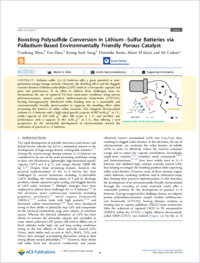Boosting Polysulfide Conversion in Lithium−Sulfur Batteries via Palladium-Based Environmentally Friendly Porous Catalyst
DOKPE
- Zhou, Tianhong ORCID University of Fribourg
- Zhao, Yan ORCID University of Fribourg
- Song, Kyung Seob University of Fribourg
- Baster, Dominika ORCID Paul Scherrer Institut, Villigen
- El Kazzi, Mario ORCID Paul Scherrer Institut, Villigen
- Coskun, Ali ORCID University of Fribourg
- 11.07.2023
Published in:
- Chemistry of Materials. - ACS Publications. - 2023
English
Lithium−sulfur (Li−S) batteries offer a great potential as next-generation energy storage systems. However, the shuttling effect and the sluggish reaction kinetics of lithium polysulfides (LiPS) result in a low specific capacity and poor rate performance. In an effort to address these challenges, here, we demonstrate the use of captured Pd from wastewater conditions using porous polyisocyanurates, named covalent isothiocyanurate frameworks (CITCFs), bearing homogeneously distributed sulfur binding sites as a sustainable and environmentally friendly electrocatalyst to suppress the shuttling effect while promoting the kinetics of sulfur redox reactions. The designed electrocatalyst endows Li−S batteries with a high initial specific capacity of 907 mAh g−1 at 1 C, stable capacity of 450 mAh g−1 after 500 cycles at 1 C, and excellent rate performance with a capacity of 681 mAh g−1 at 2 C, thus offering a new perspective for the sustainable development of electrocatalysts toward the realization of practical Li−S batteries.
- Faculty
- Faculté des sciences et de médecine
- Department
- Département de Chimie
- Language
-
- English
- Classification
- Chemistry
- License
-
License undefined
- Open access status
- green
- Identifiers
- Persistent URL
- https://folia.unifr.ch/unifr/documents/325698
Statistics
Document views: 178
File downloads:
- acs.chemmater.3c00544_0: 298
